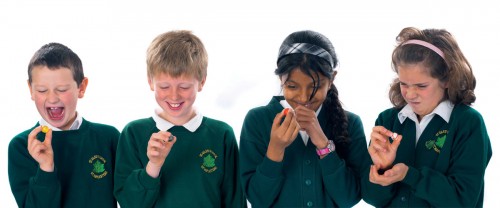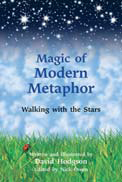David Hodgson presents two stories to get your class pondering the way they view the world...
With my latest book, Magic of Modern Metaphor, my intention was to write stories full of the wisdom of the world, so it seems appropriate to start this article with a story that summarises the impact that brilliant teachers can have:
During a prolonged period of snow, Alice’s father had to work from home. She frequently interrupted his phone calls despite promising to stay out of his way until he’d finished. To buy peace he supplied Alice with challenges and questions based on a large map of the world as big as a rug.“Find 10 places beginning with ‘B’”, “Find the country surrounded by the most oceans”. On each occasion the tenacious 10-year-old returned far sooner than he’d expected. In desperation he tore up the map into around 50 pieces and asked Alice to go away and restore it with tape like a jigsaw puzzle. She returned in minutes with the map and a big smile. “How did you do that so quickly?” he asked.
“Well, I’d already drawn a picture of myself on the back of the map and when I put myself together the world came together.”
In this tale is the secret of the power of stories and the role of teachers. When we put ourselves together the world comes together; on one side of the map we find ourselves and on the other side is the story. Primary teachers are experts at helping children put themselves together. I’ve seen children walk out of school looking and feeling ‘bigger’, believing they can be anyone or anything they desire, because of a few words of magic from their teacher. That feeling can last a lifetime. The right story at the right time delivers such magic, so I wanted to create a collection of stories that could help teachers deliver.
What follows are two of those stories. They’re designed for sharing in class, and come with follow-on questions and activities to help get children thinking about their meaning.
Grandad was baby-sitting Rosy. She was excited because of a game she had played at nursery. She said she’d like to teach her Grandad something. She brought over a piece of A4 paper and handed it to him. She explained that it was an amazing thing but the magic was hidden because we see it everyday. “When the sheet is folded in half it’s exactly the same shape!” She demonstrated how the length to width proportions were identical. “This happens if you fold it again and again. Isn’t that clever, Grandad?”
“Yes it is. Why is it like that?” he asked.
“It’s so printers in the olden days could print the same page in different sizes without having to lay out a new page. Our teacher said there is magic like this in all of us, we just don’t notice it.”
Possible discussion points:
• What amazing things can we do that have become so familiar that we’ve stopped seeing the magic?
• Look for the positive inside ourselves/others and we’ll find it.
Overlooking the familiar
This activity is more difficult than you might think. Armed with a mobile phone with a camera, or good old-fashioned pen and paper, take –10 minutes to carry out a little research around the school. Identify some common features or landmarks, and make a list of things, their colour, shapes and position. Then, in class, ask students questions to explore their awareness. For example:
• What colour is the door to the staffroom?
• What is the doormat in reception made from; how big is it?
• What colour are the curtains in the hall?
• What kind of tree stands nearest the school gates?
Alternatively, you could take photographs of familiar places around the school and ask the students to identify the location (it’s best if the photos can be displayed on a screen for the whole group to see), or ask the students to take a photo to challenge the rest of the class.
Jack asked Grandad what Aunt Joy had meant when she said Grandad was “too positive”. She’d said if he woke up bald he’d probably look in the mirror and think, that’s great I don’t have to go to the barbers anymore.
“Well I suppose compared to Joy I could look very positive. Next time she says that, tell her that if I had only one hair I’d be pleased because I could have a pony-tail. If I had two hairs I’d still be pleased because I could have a parting. If I had three hairs I’d be pleased because I could have my first plait.”
Jack suggested if he had four hairs he could copy Joy’s hair-style. They laughed as they both pulled faces to impersonate Joy.
Possible discussion points:
• Optimism is more useful than pessimism
• Every situation offers opportunity
• Do not be obsessed with how we look Try asking students the following questions:
• Why are people judged by how they look?
• What else do we judge based on how it looks? (E.g. food, X Factor contestants.) Is this fair?

This is an exploration of optimism and pessimism and judging by appearance. Bring a bag of sweets into class, to which you’ve added one or more ‘horrible’ sweets from a joke shop that look the same as the others (a bag of Minstrels, which contain some yukky sweets, would work too, unless your school bans chocolate). Reveal to the students that you’re going to give out one sweet to each person but that one or more of the sweets will taste disgusting.
Give out the sweets, then ask students to look at theirs closely and describe their feelings to their partner or table. What emotions are they going through as they imagine eating the sweet? Can they imagine what it will taste like? Do some people think “I’m going to get the horrible sweet, I just know I am”? Who would rather not eat the sweet at all for fear of receiving the vile one? When they eat the sweet, encourage a full experience of the flavours released in different parts of the mouth. (You may wish to hold back the vile sweets to ensure no children are embarrassed. Remember not to leave them in the staffroom though…)
Consider:
Emotions such as anticipation, excitement, nervousness, relief and disappointment are usually created by our minds. Much of life follows a similar pattern. Being negative tends to result in people experiencing less and achieving less in life.
 David Hodgson has written four books for teachers. The stories in this article are from his latest book of stories, Magic of Modern Metaphor: Walking with the Stars (Crown House Publishing 2010, ISBN: 9781845903947) which follows the adventures of a boy growing up under the wing of his Grandad in the North-East of England. Edited by Nick Owen, it’s priced at £16.99 and is available from all good bookstores. Visit crownhouse.co.uk
David Hodgson has written four books for teachers. The stories in this article are from his latest book of stories, Magic of Modern Metaphor: Walking with the Stars (Crown House Publishing 2010, ISBN: 9781845903947) which follows the adventures of a boy growing up under the wing of his Grandad in the North-East of England. Edited by Nick Owen, it’s priced at £16.99 and is available from all good bookstores. Visit crownhouse.co.uk
Behaviour management: choosing the right words
Behaviour Management
How children react to a moral dilemma may be down to your teaching
Ace-Classroom-Support
